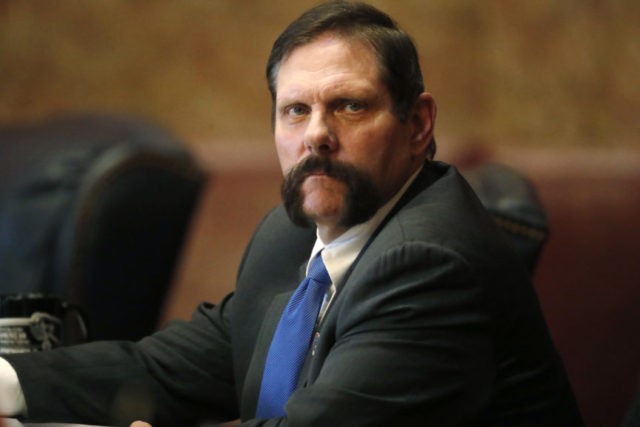DENVER (AP) — For four weeks, Colorado’s Democratic senators ended each morning’s floor business with appeals, many of them painfully personal, to debate whether to expel a Republican lawmaker accused of groping a young aide’s buttocks. The expulsion vote failed.
That contrasted with the dramatic March 9 expulsion of a suburban Denver representative accused of harassing five women, including a fellow Democrat. Steve Lebsock was the second U.S. state lawmaker ousted over misconduct since the rise of the #MeToo movement last fall.
In statehouses across the nation, elected officials are struggling to hold their own accountable. And on Thursday, Colorado lawmakers will receive a consultant’s recommendations for improving a Capitol harassment policy — one they hope to adopt before the 2018 session ends on May 9.
“I love working here, but this was also the first place in my career that I experienced sexual harassment and pervasive sexism,” Sen. Kerry Donovan said during one of those appeals for debate. She said she has been judged on her “appearance, willingness to date, marital status, haircut, sexual orientation, and vocal assessments of my butt and legs.”
Colorado’s policy considers allegations, investigations and punishment confidential and off-limits to the public. It’s up to the accuser whether to release his or her complaint. It defines offensive conduct, but leaves it up to chamber leaders to decide what punishment, if any, to mete out. And it allows third-party investigations that experts say makes it easier for victims to file complaints but which some lawmakers consider incomplete or biased toward accusers.
An Associated Press analysis in January found that more than three-fourths of U.S. states have at least one legislative chamber that has updated its sexual harassment policy during the past several months, developed specific proposals to do so or undertaken a review of whether changes are needed.
Legislative chambers in Alaska, California, Maryland, Minnesota, Oregon and Rhode Island are among states considering improved policies on sexual harassment. New York lawmakers adopted a policy last week that applies to both state and local governments. New Mexico lawmakers overhauled the Legislature’s anti-harassment policy in January, ahead of their session.
Nearly 90 bills or resolutions have been introduced in statehouses this year on the issue, according to the National Council of State Legislatures. They range from creating personnel offices to penalties for those who retaliate against complainants.
Colorado Senate President Kevin Grantham has called for prosecutors to investigate legislative harassment complaints. Sen. Lucia Guzman — who resigned as minority leader to protest the handling of the Sen. Randy Baumgardner case — said Grantham’s proposal unfairly raises the bar for those seeking redress.
An independent investigator determined that it appeared “more likely than not” that Baumgardner grabbed and slapped the buttocks of a legislative aide for a Democratic member multiple times in 2016. Baumgardner denied any wrongdoing but agreed to step down as committee chair.
Grantham, who blasted the investigation, closed the case in February and refused to introduce the Democratic resolution to oust Baumgarder for more than a month.
“Either we have a sexual harassment policy or we don’t,” said Sen. Rhonda Fields, a Democrat. “Either we’re going to empower victims to come forward or we’re going to shame them into silence.”
In Colorado, five lawmakers have been formally accused of misconduct in recent months.
“What the citizens of Colorado deserve is a policy that’s designed to prevent harassment in the first place,” said Craig Morgan, a Phoenix attorney who prepared an investigative report that preceded Arizona Rep. Don Shooter’s Feb. 1 expulsion. “That means a zero tolerance policy.”
Morgan said an ideal policy would allow reports on elected officials to be released to the public while protecting victims’ privacy. Investigations should not be referred to other state agencies to remove the element of politics, he said.
Victims of statehouse harassment “are not asking for the press to know what they’ve gone through,” Morgan said. “They’re asking for a professional life that is free from harassment.”
___
Associated Press writers Susan Montoya Bryan in Albuquerque and David Klepper in Albany, New York contributed to this report.

COMMENTS
Please let us know if you're having issues with commenting.